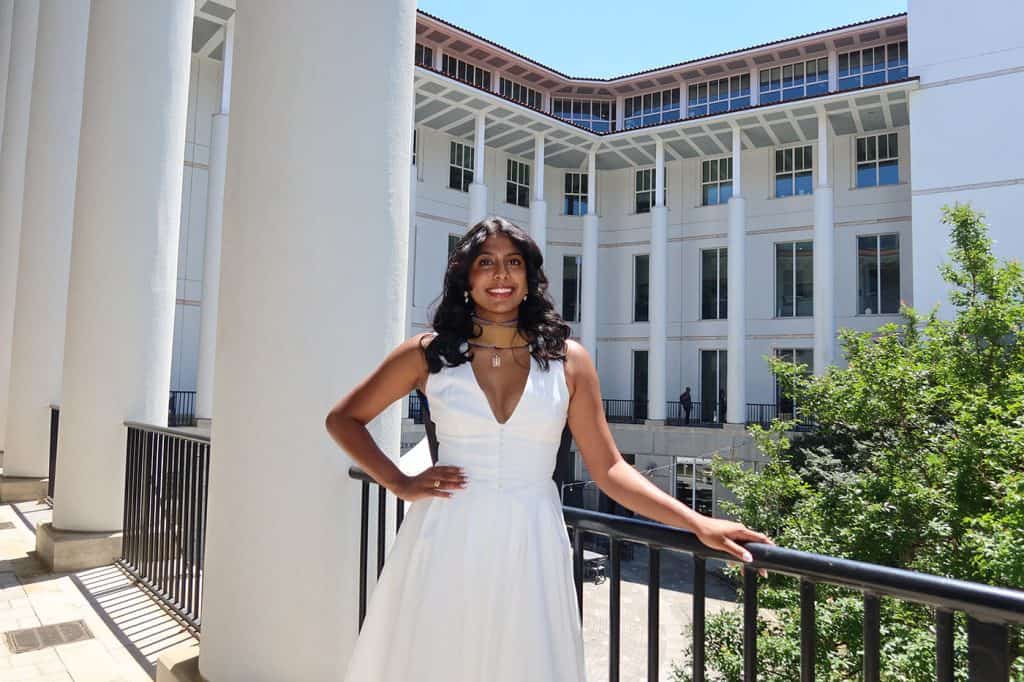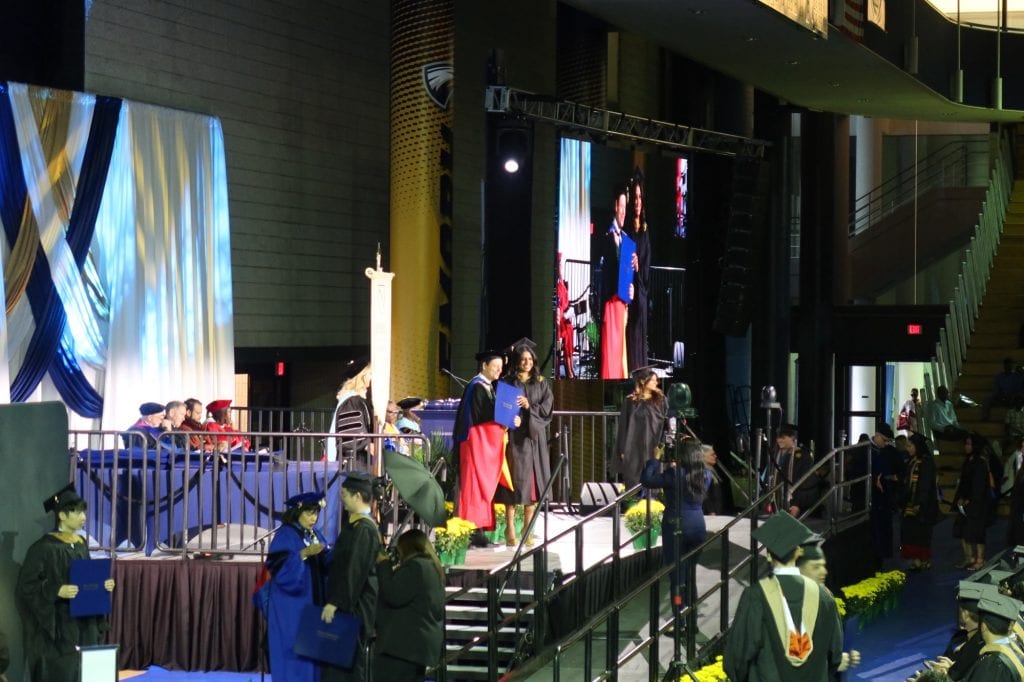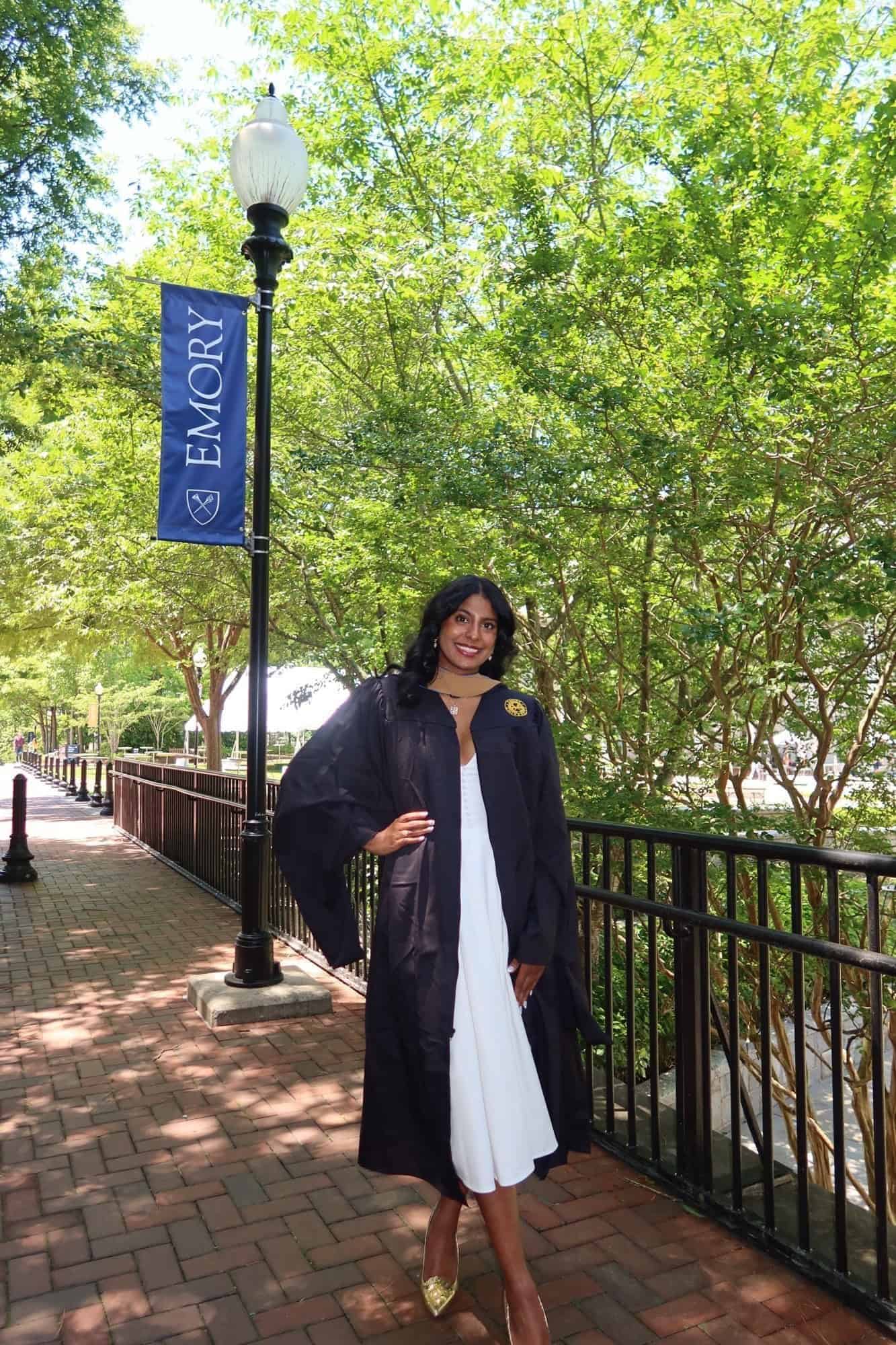Student Spotlight: Neha Mandalapu 25MiM
In our student spotlight series, we’re featuring students across Goizueta’s programs to share their unique paths and aspirations. As a Master in Management student in the Class of 2025, Neha Mandalapu brings a dynamic, interdisciplinary perspective to Goizueta Business School. With a background in behavioral neuroscience, a passion for dentistry, and hands-on experience in venture capital, Neha is charting a unique course toward building a purpose-driven career in healthcare and business. We caught up with her to learn more about her journey, leadership roles, exciting future plans, and the advice she has for students looking to make the most of their time at Goizueta.

Tell us a little about yourself! What brought you to Goizueta’s Master in Management program, and what makes your background unique?
I’ve always been someone who finds meaning in the intersections between disciplines, between people, and between ideas, and I would consider my background to be profoundly multifaceted. My undergraduate studies in behavioral neuroscience taught me to further understand the invisible patterns behind how people think, feel, and navigate the world, revealing the mechanics of behavior that so often go unseen. Dentistry immersed me in hands-on clinical care, working across specialties and learning from renowned dentists and surgeons who showed me how precision and empathy come together at the chairside. And my work in healthcare innovation and social impact challenged me to think systemically about the gaps in how care is delivered.
But the more I moved between these spaces, the more I realized something was missing: the strategic and operational toolkit to scale what I cared about. As someone who thrives as a curious and unconventional mind, I was drawn to a program that values range, creativity, and students who build their own path. The Master in Management program gave me the business fluency and leadership depth to transform complex ideas into meaningful, actionable change.
As a Northeastern alum, experiential learning shaped the foundation of how I approach growth, through immersion, reflection, and impact. Goizueta’s hands-on approach felt like a natural continuation of that journey, giving me the structure to sharpen my thinking and the space to stretch beyond it.
My path hasn’t been linear, but it’s been deeply intentional. Each chapter has shaped how I think, connect, and lead, and that perspective became my greatest contribution at Goizueta.
You’ve had a diverse journey—from behavioral neuroscience to the dental field. How have these experiences shaped your perspective as a Master in Management student?
I bring a dynamic and multifaceted lens to every room I enter. With roots in behavioral neuroscience and clinical dentistry, I understand both the complexity of human decision-making and the nuance of patient care. That blend shaped how I approached the Master in Management program, not just as a business student, but as someone trained to think across disciplines, connect insights, and lead with intention.
In team projects, class discussions, and real-world cases, I applied that lens constantly. I approached challenges by balancing logic with empathy, grounding strategy in behavior, and ensuring our ideas were innovative, practical, and human-centered. Whether we were working through go-to-market plans or systems design, I brought a perspective that asked not just “Who does it work for, and why?” but who’s being left out and why? That mindset allowed me to contribute in a way that was both analytically rigorous and deeply aware of impact.
In a program designed to shape future leaders and visionaries, I learned the value of showing up with range, clarity, and a willingness to think differently. That kind of perspective is vital to growth. The future will be shaped by those who are curious, grounded, and unafraid to challenge the frameworks they inherit. In a cohort full of bright, driven thinkers, what set my perspective apart was its ability to bridge disciplines and bring depth beyond the expected. That’s the voice I brought to Goizueta and the one I’ll carry forward with me.
What inspired your passion for dentistry, and how does business education fit into your long-term goals?
My passion for dentistry was sparked by the way it blends human connection with precision. I was drawn to the clinical side, the science, the hands-on skill, but what made it meaningful was the chairside interaction: listening to fears, rebuilding trust, and helping patients feel seen in vulnerable moments and in uncertainty. Over time, I realized that delivering care isn’t just about what we do, it’s how we make people feel. That’s what inspired me to pursue this path.
I also began to notice a deeper parallel: effective leadership mirrors great clinical care seen chairside. Both require anticipating unspoken needs, responding with clarity and compassion, and helping others feel safe in the face of the unknown and moments of uncertainty.
But I also saw the limitations. Great care doesn’t scale on compassion alone. If we want to improve access, equity, and patient experience, we need to think beyond the operatory and build systems that support those values. That’s what led me to Goizueta. The Master in Management program helped me further develop my strategic thinking, systems awareness, and leadership capabilities to transform ideas into execution and reality.
Dentistry offers something irreplaceable: the chance to innovate at both the individual and systemic level, connecting with patients in moments of vulnerability, while also reimagining how care is delivered, accessed, and experienced. Whether it’s rethinking patient communication, designing more inclusive models of care, or using behavioral data to inform treatment, I want to be part of the next wave of innovation in oral health. Goizueta gave me the strategic foundation to scale those ideas into impact.

During your time at Goizueta, you’ve taken on leadership roles like VP of your cohort and working with the Peachtree Minority Venture Fund. What have those experiences taught you?
Leading Goizueta’s inaugural Master in Management program class as VP taught me that real leadership doesn’t wait for a path; it builds one. With no established roadmap, our student council helped transform a brand-new program into a united community, organizing events, launching initiatives, and advocating for our classmates with faculty and administration. Along the way, I learned from student leaders, professors, and my own peers, realizing that leadership is not an individual pursuit, but a collaborative effort built on trust, inclusion, and shared purpose. I took pride in creating a space where others could thrive.
At the Peachtree Minority Venture Fund, I served in the healthcare sector team, where I connected directly with founders and saw how capital can be used to break down barriers. I also experienced how leadership can drive impact on a broader scale and witnessed how capital can unlock opportunity and how bias, when unchecked, can block it. I sourced underrepresented entrepreneurs, conducted rigorous due diligence, and pitched businesses for funding, an experience rooted in both analytical rigor and social impact and work that directly addressed the barriers entrepreneurs face in an inequitable venture ecosystem. Collaborating with my team, mentors, and entrepreneurs pushed me to challenge my own cognitive biases and make decisions grounded in both data and purpose.
These experiences redefined how I see leadership as the ability to unite people, learn from them, and drive lasting change. It’s a mindset I will carry into my aspirations in the dental landscape, where I aspire to deliver evidence-based care while leading with empathy and expanding access for the communities I serve.
Tell us more about your summer and fall plans—what are you most looking forward to in your internship, European master’s program, and dental school applications?
This summer, I wrapped up an internship in New York at EF Hutton, an investment bank recognized for its work in capital markets, private equity, and strategic advisory. The experience gave me hands-on exposure to live transactions and sharpened my perspective on how financial strategy can shape the healthcare and biotech landscape. Alongside this, I had the privilege of immersing myself in the Liu Advanced Clinical Fellowship in Implant Dentistry at NYU College of Dentistry, an experience that not only deepened my understanding of advanced implant dentistry but also allowed me to build meaningful connections and friendships that I’ll carry with me throughout my dental career.
This fall, I’ll be pursuing a Master’s in Strategic Marketing at Imperial College London, drawn to its global perspective, data-driven approach, and focus on innovation, which are skills I see as critical in modern healthcare delivery and practice management. At the same time, I’ll be applying to dental schools across the U.S.
It’s a packed year, but what excites me most is the opportunity to merge these experiences into a foundation for the kind of dentist I aspire to be, one who not only practices evidence-based care but also reimagines how dentistry can connect, innovate, and lead.
You mentioned a passion project that combines neuroscience and dentistry, as well as a publication with Stanford. Can you share more about that work and what excites you about it?
Absolutely! Exploring across disciplines helped me see patient care through a more holistic lens, one that connects biology, behavior, and communication. I’ve seen how fear, resistance, and misunderstanding can derail even the most clinically sound treatment plans. I wanted to create something that empowers providers to connect more deeply with patients, not just through their clinical skill set, but through emotional insight. That’s what inspired me to build SynapseSmiles, a behavioral AI copilot for dentists. It honors the emotional language of dentistry and fuels empathetic, chairside-driven care by helping providers interpret patient cues and generate emotionally intelligent phrasing in real time, informed by neurobehavioral profiles. SynapseSmiles is my way of scaling empathy, helping providers pause where it matters, and remember that we’re treating more than enamel, but a human being.
Earlier in my journey, I had the opportunity to collaborate with an international team of dentists and researchers at Stanford on a project focused on periodontal regeneration. We studied the junctional epithelium, a critical barrier that protects the tooth tissue interface from bacterial invasion, and explored how it responds at the cellular level to chronic inflammation. Using a ligature-induced periodontitis model and advanced immunohistochemistry techniques, we uncovered how epithelial cells undergo epithelial-to-mesenchymal transition (EMT), a process essential for tissue repair and regeneration.
Our work showed that imbalances in BMP/WNT signaling disrupt this transition and impair the tissue’s ability to naturally regenerate. We also identified a downregulation in structural proteins like Laminin5 and β4 integrin, pointing to a broader breakdown in the epithelium’s attachment and repair mechanisms. This research, which was recently accepted for publication in the Journal of Dental Research, lays the foundation for more targeted and biologically informed therapies for periodontal disease, a condition affecting nearly half of U.S. adults.
What excites me most is the potential impact this research holds for the future of dentistry. Periodontal disease is one of the most pervasive oral health conditions, yet our regenerative treatment options remain limited and nonspecific. By identifying a precise stem cell signaling imbalance that disrupts healing at the junctional epithelium, our findings open the door to therapies that are not only more targeted but also biologically intelligent. This work challenges the idea that degeneration is inevitable and pushes the field closer to true regeneration, where we don’t just slow disease progression, but actively restore the body’s natural architecture. It’s a reminder that science, when deeply understood, can become a tool for hope.
What’s been your favorite class or professor at Goizueta, and why?
My favorite professor at Goizueta was J.B. Kurish. I took his Financial Management course in the fall, something that once felt way outside my comfort zone. As someone who used to shy away and once wanted to run the other way at the sight of numbers, I never thought I’d enjoy finance, let alone find it empowering. But Professor Kurish had a way of making things click. He broke down complex concepts with clarity and brought humor into every lecture. He didn’t just teach us how to manage capital; he taught us how to think critically, ethically, and with context. He helped me see the story behind the numbers, along with the decisions, the risks, and the responsibilities behind them.

Later, I had the chance to work with him more closely through the Venture Capital & Minority Entrepreneurship course while serving as an Associate for the Peachtree Minority Venture Fund. That experience added another layer of depth to what I had learned, as we applied those frameworks to founders, investment decisions, and outcomes with meaningful impact.
More than just a professor, he became a pivotal mentor in my journey when I was still finding my voice in the business world. Whenever things felt overwhelming, his consistent reminder, “Do the right thing,” grounded me. As funny as it sounds, those were the exact words he told me and our cohort all the time. And over time, they stuck. They became a quiet mantra that shaped my decision-making, not just in the classroom, but far beyond it.
What made Professor Kurish so impactful wasn’t just what he taught; it was how he believed in each of us. His trust gave me the space to grow into someone who could lead with both logic and empathy.
What advice would you give to prospective students considering the Master in Management program or someone with an interdisciplinary background like yours?
Don’t be afraid to take up space. The Master in Management program isn’t about fitting into a mold; it’s about expanding what leadership looks like to you. Coming in with my background, I worried whether there was even a space for someone like me in the business world, whether my background, my voice, would resonate. But what I discovered is that difference isn’t something to hide here, it’s what makes you indispensable and let alone, irreplaceable.
This program thrives on range. It’s built for curious, unconventional, and dynamic thinkers who are ready to ask bold questions and approach challenges from different angles. Whether you’re coming from science, the arts, or something entirely different, your perspective matters, and you’ll find ways to apply it in every class, case, and conversation.
Own your story. Be open to learning, but don’t dilute what makes you YOU. The Master in Management program will push you, stretch you, and sharpen your thinking, but only if you bring your whole self to the table. And when you do, you’ll leave with more than just business acumen and a phenomenal network; you’ll leave with clarity, confidence, and the ability to lead in any room you choose to enter.
Learn more about the new Master in Management program.
